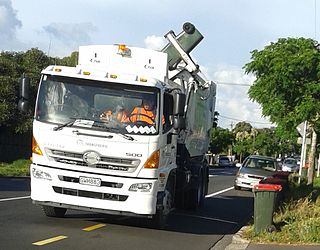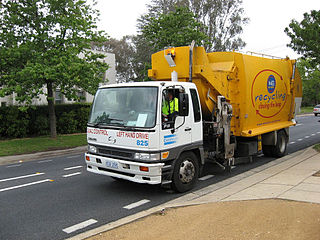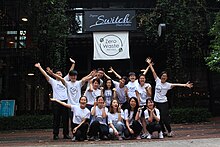
Waste management or waste disposal includes the processes and actions required to manage waste from its inception to its final disposal. This includes the collection, transport, treatment, and disposal of waste, together with monitoring and regulation of the waste management process and waste-related laws, technologies, and economic mechanisms.

Zero waste is a set of principles focused on waste prevention that encourages redesigning resource life cycles so that all products are repurposed and/or reused. The goal of the movement is to avoid sending trash to landfills, incinerators, oceans, or any other part of the environment. Currently 9% of global plastic is recycled. In a zero waste system, all materials are reused until the optimum level of consumption is reached.

Plastic recycling is the processing of plastic waste into other products. Recycling can reduce dependence on landfill, conserve resources and protect the environment from plastic pollution and greenhouse gas emissions. Recycling rates lag those of other recoverable materials, such as aluminium, glass and paper. Through 2015, the world produced some 6.3 billion tonnes of plastic waste, only 9% of which has been recycled, and only ~1% has been recycled more than once. Additionally, 12% was incinerated and the remaining 79% sent to landfill or to the environment including the ocean.
A landfill tax or levy is a form of tax that is applied in some countries to increase the cost of landfill. The tax is typically levied in units of currency per unit of weight or volume. The tax is in addition to the overall cost of landfill and forms a proportion of the gate fee.

Waste sorting is the process by which waste is separated into different elements. Waste sorting can occur manually at the household and collected through curbside collection schemes, or automatically separated in materials recovery facilities or mechanical biological treatment systems. Hand sorting was the first method used in the history of waste sorting. Until now this method is still used.

This article outlines the position and trends of recycling in Canada. Since the 1980s, most mid to large municipalities in most provinces have recycling programs, relying on curbside collection with either bins, boxes, or bags. These systems are not standardized, and the specific process differs for each province. Certain provinces have container-deposit systems in place for bottles, cans, and other beverage containers.
There is no national law in the United States that mandates recycling. State and local governments often introduce their own recycling requirements. In 2014, the recycling/composting rate for municipal solid waste in the U.S. was 34.6%. A number of U.S. states, including California, Connecticut, Delaware, Hawaii, Iowa, Maine, Massachusetts, Michigan, New York, Oregon, and Vermont have passed laws that establish deposits or refund values on beverage containers while other jurisdictions rely on recycling goals or landfill bans of recyclable materials.

In 2015, 43.5% of the United Kingdom's municipal waste was recycled, composted or broken down by anaerobic digestion. The majority of recycling undertaken in the United Kingdom is done by statutory authorities, although commercial and industrial waste is chiefly processed by private companies. Local Authorities are responsible for the collection of municipal waste and operate contracts which are usually kerbside collection schemes. The Household Waste Recycling Act 2003 required local authorities in England to provide every household with a separate collection of at least two types of recyclable materials by 2010. Recycling policy is devolved to the administrations of Scotland, Northern Ireland and Wales who set their own targets, but all statistics are reported to Eurostat.

Armenia is underdeveloped in its waste management and recycling activities.

Waste are unwanted or unusable materials. Waste is any substance discarded after primary use, or is worthless, defective and of no use. A by-product, by contrast is a joint product of relatively minor economic value. A waste product may become a by-product, joint product or resource through an invention that raises a waste product's value above zero.

The management of waste in New Zealand has become more regulated to reduce associated environmental issues. According to OECD data, New Zealand is the third most wasteful country in the OECD.

Waste management in Bangladesh faces many challenges due to its large, rapidly growing population in a densely populated country.
There are various issues of waste management in Thailand, including excessive plastic use, industrial waste, among others.
Turkey generates about 30 million tons of solid municipal waste per year; the annual amount of waste generated per capita amounts to about 400 kilograms. According to Waste Atlas, Turkey's waste collection coverage rate is 77%, whereas its unsound waste disposal rate is 69%. While the country has a strong legal framework in terms of laying down common provisions for waste management, the implementation process has been considered slow since the beginning of 1990s.

Recycling in Australia is a widespread, and comprehensive part of waste management in Australia, with 60% of all waste collected being recycled. Recycling is collected from households, commercial businesses, industries and construction. Despite its prominence, household recycling makes up only a small part (13%) of Australia's total recycling. It generally occurs through kerbside recycling collections such as the commingled recycling bin and food/garden organics recycling bin, drop-off and take-back programs, and various other schemes. Collection and management of household recycling typically falls to local councils, with private contractors collecting commercial, industrial and construction recycling. In addition to local council regulations, legislation and overarching policies are implemented and managed by the state and federal governments.

Taiwan has one of the most efficient recycling programs globally, with a 55% collection rate from households and businesses and a 77% collection rate from industrial waste in 2019. Taiwan’s high recycling rates are unattainable in most countries due to Taiwanese geographical advantages along with efficient waste processing technologies and systems.
China's waste import ban, instated at the end of 2017, prevented foreign inflows of waste products. Starting in early 2018, the government of China, under Operation National Sword, banned the import of several types of waste, including plastics. The ban has greatly affected recycling industries worldwide, as China had been the world's largest importer of waste plastics and processed hard-to-recycle plastics for other countries, especially in the West.

Waste management in South Korea involves waste generation reduction and ensuring maximum recycling of the waste. This includes the appropriate treatment, transport, and disposal of the collected waste. South Korea's Waste Management Law was established in 1986, replacing the Environmental Protection Law (1963) and the Filth and Cleaning Law (1973). This new law aimed to reduce general waste under the waste hierarchy in South Korea. This Waste Management Law imposed a volume-based waste fee system, effective for waste produced by both household and industrial activities.

South Korean waste disposal policy operates under the Ministry of Environment. Waste is required to be separated into four parts: landfill waste, organic waste, recyclable waste, and large waste items. Recyclable waste such as: paper, plastics and glass, should be separated before disposal. Fines are applicable to violations of the policy.

Waste management in Australia started to be implemented as a modern system by the second half of the 19th century, with its progresses driven by technological and sanitary advances. It is currently regulated at both federal and state level. The Commonwealth's Department of the Environment and Energy is responsible for the national legislative framework.

















